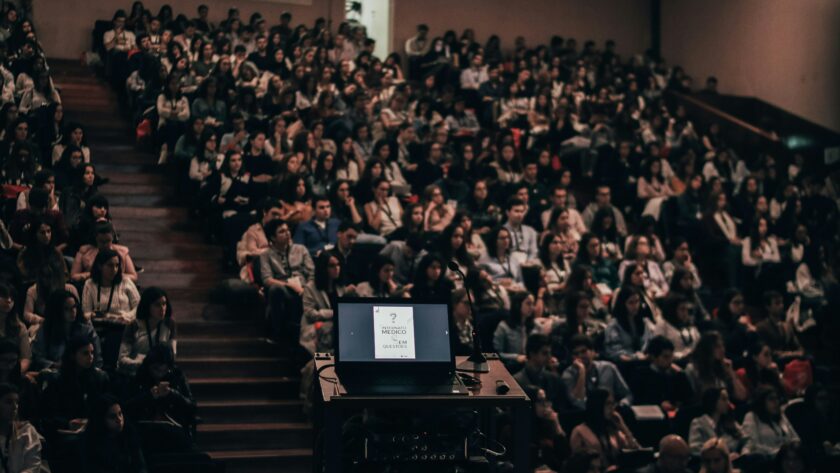Our training courses are CPD accredited and we provide a certificate of completion, so as a first option, you may be able to get funding from your employer to take part.
Alternatively, we offer a number of in-house bursary opportunities that you can apply for on our website:
- Women in Games covers 25% of the Story for Video Games course price and is available to one female applicant per cohort. To apply, fill out our short form.
- Running the Show covers 100% of the course price and is available to one applicant per cohort of Running the Show. To apply, fill out the application form and explain how you meet the entry criteria.
- New Writing North are offering 10 discounted bursary places on Story for Screenwriting across 2024 as part of the North of Tyne Cultural Skills Programme. Apply direct to NWN.
- Unrepresented voices in publishing covers 50% of the course fees and is available to two applicants from underrepresented backgrounds per cohort of Story for Novelists. To apply, fill out our application form.
THIRD PARTY FUNDING OPPORTUNITIES
Looking for funding further afield can be difficult and time-consuming, so we’ve compiled a list of third-party UK-based sources that you can look through and decide the best route for you.
Categories include UK regional hubs, underrepresented groups and levels of experience. This list is accurate as of April 2024 and we’ll be updating where we can, but please note that we cannot take responsibility for any third-party funding opportunity closing early/changing criteria etc. If you have any questions, come chat to us.
➡️ ScreenSkills
If you’re passionate about a career in film and TV and are unable to develop work for financial reasons, you can apply for a ScreenSkills bursary, provided you:
- Currently work in the UK screen industries, or can demonstrate your intention to work in them
- Are eligible to work in the UK
- Are 18 years old or above
- Have a UK bank account
To increase your chances of success with your application, you need to be able to demonstrate:
- A compelling case for financial support, including the impact of the cost-of-living-crisis on your ability to invest in your own training and development
- Any barriers you may face to inclusion in the industry, for example because of where you live or because you are part of an underrepresented group
- How the training will help you fill a skills gap or shortage priority area (eg. script editing, production accounting, producing etc – most recent research is available here.)
- Whether you are working full time, or hoping to work full time, in the screen industries in the near future
- Your acceptance onto the John Yorke Story training course (contact us and we’ll provide you with a letter of endorsement)
ScreenSkills is the delegate partner for the distribution of the BFI National Lottery funds for bursaries. Priority is given to freelancers rather than those with continuous contracts. Applications are open – find more information on bursary guidelines.
➡️ The Royal Television Society
The RTS believes in diversifying and future-proofing the TV industry by channelling new voices. They award bursaries to students from lower-income backgrounds studying any subject at undergraduate or HND Level 5 or 6 who would like to pursue a career in TV, film or related media industries.
RTS provide successful applicants with:
- £1,500 per academic year
- Free access to all RTS events, screenings and lectures
- A personal industry mentor
- Free RTS Membership
Applications for the RTS Bursary Schemes are open until 24 June 2024 – here’s an application guide.
➡️ BAFTA
The BAFTA UK Scholarship Programme is open to British citizens in need of financial assistance to study eligible undergraduate and postgraduate courses in the UK. BAFTA Scholars undertaking postgraduate study receive up to £12,000 towards annual course fees (up to a maximum £20,000 across 2 years). Applications open Spring 2024.
As well as financial assistance, BAFTA scholars receive mentoring support and free access to BAFTA events around the UK. More information here.
The Prince William BAFTA Bursary fund assists junior creatives with the costs of progressing their career in film, games or TV. To be eligible, applicants must:
- Be over 18 at the time applications close
- Demonstrate financial need
- Have some experience in film, games or TV
- Have worked with partner organisations (Arts Emergency, A New Direction, BFI Film Academy, Creative Access, Film Fixer, Ffilm Cymru Wales, Fully Focussed, GMAC Film, Just Add Milk, Limit Break, London Screen Academy, MAMA Youth Project, Sara Putt Associates, Screen Alliance Wales, Screen NETS, ScreenSkills (Scotland only), Short Circuit) or taken part in BAFTA’s YGD competition.
Applications open in 2025.
LEVEL OF EXPERIENCE
For entry/early level:
➡️ BFI Network
Made possible through National Lottery funding, BFI NETWORK collaborates with film organisations and cultural venues across the UK to provide short film and early feature development funding, industry-backed professional development and networking support to producers, writers and directors aged 18 and above.
Check out the BFI NETWORK funding finder for opportunities for short films and feature treatments for fiction live action, animation, or immersive/virtual reality projects. Applications for the Short Film Fund are currently open. Read the guidelines.
2 years + experience:
➡️ The Film & TV Charity
Support, information and resources specifically for people working in film, TV or cinema, from one-off grants to help in a crisis. Visit the Financial Support page to find out more.
Stop-Gap Grants can provide immediate support to help manage urgent financial needs when you have nowhere else to turn. To apply for a one-off Stop-Gap Grant of up to £750 to help with unexpected costs, you must:
- Work in a behind the scenes role in film or TV in the UK
- Be involved in creating or distributing entertainment shown in cinemas, broadcast on UK TV channels or on-demand services, or streamed on pay-to-view digital platforms
- You need at least 40 days of paid work in the last 18 months, or to have worked for at least two years in film and TV and be seeking funding to return to work after a career break.
➡️ Arts Council England
ACE is the national development agency for creativity and culture, investing public money from government and the National Lottery in cultural organisations and creative practitioners so that everyone can participate in creativity and culture, whoever they are and wherever they live.
You can currently apply for:
- National Lottery Project Grants: an open-access programme for arts, libraries and museums projects. The fund supports thousands of individual practitioners, community and cultural organisations.
- DYCP (Developing Your Creative Practice): supports individual cultural and creative practitioners who want to take time to focus on their creative development.
For more information, visit the Open Funds webpage.
UK REGIONAL
➡️ Northern Ireland Skills Fund
The Skills Fund is a grant offered to individuals working in the Northern Ireland screen sector, designed to financially support those participating in training or development courses. A bursary can be awarded to an individual who is resident in Northern Ireland and currently working within Northern Ireland’s independent film, television and digital sector. Applicants should normally have at least one year’s experience working within the independent film, television and digital sector. In each individual case the applicant must be able to demonstrate a strategic need to attend the event.
- Who can apply?
Northern Ireland residents accepted onto a skills development or training course. - How do I apply?
Send your CV and details of the course you wish to attend, including costs, to Kerry Flynn. Applications should be received no later than 3 weeks before the start of your course. For example, if your course starts on 1st April, apply no later than 8th March. More details here.
➡️ Ffilm Cymru
Under their BFI NETWORK Wales offer, Ffilm Cymru support emerging filmmakers in Wales through their Horizons: Career Development scheme with clear personal development plans to help applicants get to the next stage in their career.
- Who can apply?
Writers, producers or directors born or based in Wales who have made some work for screen, but have not yet led on a feature film with a budget of over £1 million. - How much can I apply for?
Up to £6,000. - What do I need to apply with?
A completed application form, CV and link to a piece of work for screen, screenplay or slate overview. More information here.
If you are looking to make your first feature, also check out Horizons: Emerging Filmmaker Development.
Please note: applications for both schemes are currently closed.
➡️ Screen Scotland
Screen Scotland’s Film Development and Production Fund offers development and production funding for feature-length films and documentaries by filmmakers based in Scotland. The fund can support the following stages of the process:
- Single Project Development Funding: support towards initial development costs of a single feature film or documentary project
- Film Production Funding: support towards production costs of a film or documentary project
The aim of the funding is to support filmmakers working in live action, animation and documentary, to develop a range of feature film projects across all genres that reflect Scotland’s culture, creativity and diversity. Screen Scotland support projects with international appeal that have the potential to be distinctive, high-quality and commercially and/or creatively-driven. They also support projects that enable artists and filmmakers to take risks creatively. Visit the website for more information.
➡️ Film Hub North
Film Hub North support writers, directors and producers with funding for short film production and early-stage development work on new features. See the funding available on their website plus the films supported. Recent opportunities include:
- The Early Development Fund: supports writers at the very beginning of their development process, prior to completing the first draft of a script. Funding is available to help writers produce an initial treatment and related materials such as a mood board, with the aim of equipping writers with materials that can be used to seek support for further development.
- Short Film Funding: supports the production costs of standalone fiction shorts that showcase new perspectives from Northern filmmaking teams. The fund is intended to stimulate original idea and stories, so doesn’t support adaptations of existing material. Applications are welcomed for amounts from £5,000 to a maximum £25,000. Projects can be of any length, up to a maximum 15 minutes.
➡️ Film Hub Midlands
By providing funding and training, Film Hub Midlands aim to help more people in the region watch, make and show films. The region covers Derbyshire, Birmingham, Herefordshire, Leicestershire, Lincolnshire, Nottinghamshire, Northamptonshire, Rutland, Shropshire, Staffordshire, Warwickshire and Worcestershire.
Pitch Pots are available to support a risk and try something new. You might be new to film exhibition and want to put on your first screening or an established cinema or community screen trialling new programming. They are seeking proposals from Hub members to meet FAN priority outcomes from April 2024 – 31 March 2025.
Visit the website for information on Funding, Pitch Pots and New Releases.
➡️ Film Hub South West
Film Hub South West aims to nurture a new wave of film-making talent via a growing network of cinemas, film festivals, cross-arts venues and film exhibition organisations and by supporting writers directors and producers across Cornwall, Devon, Dorset, Somerset, Wiltshire, Gloucestershire, West of England, Hampshire, The Isle of Wight and The Isles of Scilly.
Film Hub South West can support projects by contributing to production costs on short films, or by supporting the development of a feature treatment document, with creative and professional guidance from Bristol-based BFI NETWORK Talent Executives. They also support talent not ready to apply for BFI funding – find out more here.
➡️ Film Hub South East
Part of Independent Cinema Office, Film Hub South East covers Bedfordshire, Berkshire, Buckinghamshire, Cambridgeshire, Essex, Hertfordshire, Kent, Norfolk, Oxfordshire, Suffolk, Surrey and Sussex.
They offer Training and Professional Development Bursaries to support film-sector training and attending cultural conferences and festivals for audience development. Film Hub South East can fund up to 90% of the costs of training course fees, travel and accommodation, and other professional development costs.
To apply for the Film Exhibition Fund 2024-25, you must be a Film Hub South East member. Their key priorities for this fund are:
- To create opportunities for children and young people to experience a broader screen culture
- To support public access to a wider choice of film and moving image, including stories that reflect their lives
- To tackle social, economic and geographic barriers for audiences engaging in a broad and diverse screen culture.
Read more about the application process. You can access the Film Hub South East Funding Directory here.
UNDERREPRESENTED GROUPS
➡️ Creative Access
Creative Access is a social enterprise providing career-long access, opportunities, support and training for people from under-represented groups, to make the creative industries better reflect society. Creative Access works with more than 750 employers keen to welcome individuals from under-represented groups. For information on individual support, visit this page.
➡️ Equal Access Network
Film London’s Equal Access Network (EAN) is a platform specifically tailored to support people who may feel historically overlooked or sidelined within the screen industries. Their offer spans training, events and connecting the network’s members with productions and companies.
The EAN runs a number of initiatives, including a free regular masterclasses with industry leaders and experienced practitioners, an annual New Entrants Course, covering everything from development to post-production, internship/returnship schemes, access to online resources as well as tailored careers advice, 1-2-1 CV clinics and mock interview sessions.
The EAN is free to join and open to all, from new entrants to returners to mid-level professionals in the film and TV industry, and those looking to make a career change: join here.
➡️ thinkBIGGER!
Whether you are already working in the media or aspiring to find your niche, thinkBIGGER! has a comprehensive knowledge of the skillsets needed to make the most of your talent, and offers workshops and training and consultancy to grow your skills. Read more about their opportunities.
➡️ Access to Work
Access to Work can help you get or stay in work if you have a physical or mental health condition or disability. Support depends on your needs. Through Access to Work, you can apply for:
- a grant to help pay for practical support at work
- support with managing your mental health at work
- money to pay for communication support at job interviews
The scheme also offers practical support, mental health support and communication support for job interviews. For further details, visit this page.
➡️ Press Reset
Press Reset is the BFI’s campaign to inspire decision-makers in film and TV to reset practices involving disabled people and establish a new, more inclusive normal. Access a list of organisations approved by list here.
➡️ Raising Films
Raising Films calls on the UK screen sector to recognise the value of its parent and carer members and ensure the best possible working practices are available to them. They challenge the sector to find ways to prevent the loss of talent and enable the working parent and carer community to grow in number so all voices can be heard.
Since 2015, Raising Films has been carrying out research, running training programmes, publishing resources and awarding the Raising Films Ribbon for best practice. Browse their Financial Support page.
Research by Stella Parker:
Stella is a researcher and editor, specialising in theatre and film. She has worked as a casting assistant for Mad Dog, archive assistant at the Theatre Collection in Bristol, video editor for the BFI and a panel member at London Film Festival. She has an MPhil in Theatre and Performance from the University of Bristol.



